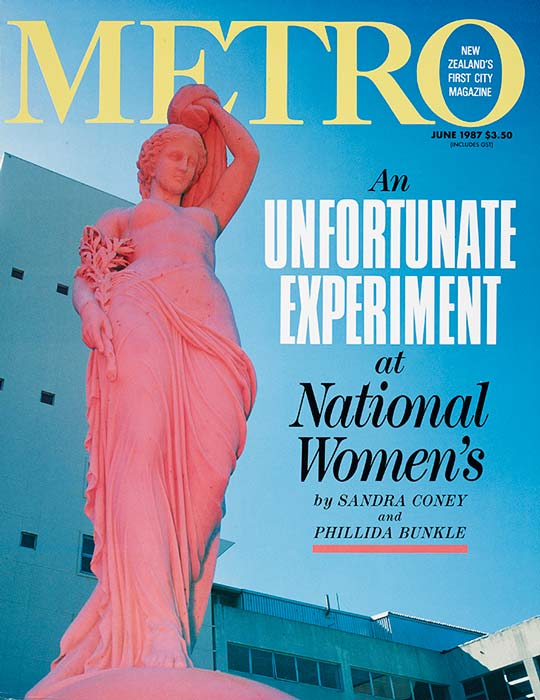A government inquiry into unethical research practices related to the treatment of cervical cancer at National Women’s Hospital was instigated by Women’s Health Action (formerly Fertility Action) and was a major challenge to medical dominance at the time. The Cartwright Inquiry (1987 – 1988) was a watershed moment in patient rights, not only in New Zealand, but globally. It led to significant reforms towards a patient-centred health care system by giving patient rights the force of law in New Zealand – a global first – and establishing a system of accountability to patients external to the medical profession. This was achieved through the creation of the role of the ‘Health and Disability Commissioner’.
The Cartwright Inquiry has resulted in;
- The implementation of a successful national cervical screening programme that has led to a dramatic reduction in deaths from cervical cancer in the past two decades.
- The establishment of independent ethics committees focused on protecting patients’ rights.
- A shift towards patient-centred health care, which has facilitated health consumer participation in health service decision making.
- Consumer representation on decision making bodies are now an accepted practice.
In this section you can read about the Cartwright Inquiry and its legacy.
‘An unfortunate experiment’
In 1987, Women’s Health Action founders Sandra Coney and Phillida Bunkle published an article called ‘An unfortunate experiment at National Women’s Hospital’ in the monthly Auckland magazine ‘Metro.’ The article outlined an unethical study at National Women’s Hospital, the country’s premier women’s hospital. The study, led by Dr Herbert Green, started in 1966 and involved following women with major cervical abnormalities without definitively treating them. This occurred without the women’s knowledge or consent. Twenty years on, many had developed cervical cancer, and some had died. The revelations led to public outrage and ultimately to a Government ordered Ministerial Committee of Inquiry.

The inquiry
The inquiry into the allegations concerning the treatment of cervical cancer at National Women’s Hospital in 1987 and 1988, known as the ‘Cartwright Inquiry’ (after the presiding judge, Judge Dame Silvia Cartwright), is remembered as one of the most significant medical events of the twentieth century. While focused on the treatment of cervical cancer, the inquiry lead to the scrutiny of a range of issues related to the practice of medicine in New Zealand. This included research practices, teaching methods, patients’ rights, and medical dominance. It exposed a core dynamic of twentieth century medical practice – doctors, with their appeals to objective, rational, and scientific knowledge knew best, and patients, particularly women, were irrational, hysterical, and incapable of making decisions for themselves.
Advancements in women’s health care
The Cartwright Inquiry intersected with the feminist women’s health movement and presented a profound challenge to medical dominance and the ‘doctor knows best’ mentality that pervaded the times. To respond to this need, women’s health advocates, groups, and collectives dedicated themselves to empowering women to be active partners in their health care.
- Supporting women to be able to make informed choices about health interventions by providing them with evidence-based information
- Questioning the medicalisation of women’s bodily processes such as menstruation, childbirth and menopause
- Increasing women’s understanding of their bodies and bodily processes.
These advocates and groups were active in ensuring the Cartwright Report recommendations were implemented and that they maintain accountability to health consumers. The goals and activities of women’s health groups have changed over time, yet a commitment to ensuring the legacy of the Cartwright Inquiry is not forgotten remains.
The Cartwright Report

The Report of the Cervical Cancer Inquiry (the Cartwright Report) was released on the 5th August 1988. In it, Judge Cartwright found that the allegations made in the Metro article were largely correct. Judge Cartwright identified not only a failure to adequately treat cervical cancer in some patients but also significant and sustained failures in doctors’ ethical practices in relation to respect, communication, information sharing, and obtaining informed consent. Judge Cartwright also identified systemic failures in the ethical approval and surveillance procedures for the conduct of research and new treatments at National Women’s hospital, noting that the ethics committee lacked independence and failed to protect patients and promote their welfare. Judge Cartwright recommended a series of reforms to enhance patient welfare and to ensure the protection of patient rights.
Key recommendations included;
- The development of a legislated Code of Patients’ Rights.
- The establishment of an independent Health Commissioner, external to the medical professions, whose role would include:
- Negotiation and mediation of complaints and grievances by patients;
- Heightening the professionals’ understanding of patients’ rights.
- The establishment of independent patient advocates.
- The establishment of an independent nationwide system of ethics committees that prioritise the protection of research participants. The ethics committees were to be composed of half lay membership and chaired by a layperson.
- The urgent implementation of a nationally planned population-based cervical screening programme – now the National Cervical Screening Programme.
The Legacy of the Cartwright Inquiry
The reforms recommended by Cartwright have resulted in great advances in human rights and ethics in health care, placing New Zealand as a world leader in protecting the rights of health care consumers. The report was a blueprint for patients’ rights in New Zealand and recommended the establishment of a Health and Disability Commissioner, a system of ethical review, and the establishment of a National Cervical Screening Programme. It was also the first time that there was a serious focus on patients and consumers in the health care system and a consideration of the need for patient-centred health care.
Publications

Sandra Coney has authored a book which tells the story of ‘The Unfortunate Experiment’ and its consequences, titled: ‘The Unfortunate Experiment: the full story behind the inquiry into cervical cancer treatment’ (Penguin Books, 1988). She also edited a follow up volume which explores the aftermath of the inquiry and the struggle to ensure its recommendations were implemented: ‘Unfinished Business: What happened to the Cartwright Report?’ (Women’s Health Action, 1993). A more recent volume, ‘The Cartwright Papers: Essays on the Cervical Cancer Inquiry 1987-1988’ (Bridget Williams Books, 2010), is also recommended reading.
Criticisms
The findings of the Cartwright Inquiry and the subsequent Cartwright Reforms have not, however, been immune to challenges and criticism. In the early years following the inquiry there was an application for judicial review of the inquiry which was rejected by the High Court. There were also several public media challenges to the inquiry and its findings. Some critics argued that, because feminist women’s health activists instigated the inquiry, it was overly influenced by their agenda. However, the government stood by the report and progressed with implementing the report’s recommendations regardless.
Criticism of the inquiry has recently been renewed with the release of a book on the history of the ‘Unfortunate Experiment’. University of Auckland Professor of History Linda Bryder (2009) argues that there were no adverse effects on the women involved and that the recommendations for reform made little contribution to changes already underway within medicine and patient rights. However, the claims made by Bryder have been refuted by several scholars.1
‘Cartwright Comes of Age?’ seminar
The Office of the Health and Disability Commissioner and Code of RightsThe legacy of the Cartwright Inquiry was the theme of a one-day seminar held by Women’s Health Action in 2010: ‘Cartwright Comes of Age? Maintaining momentum towards a New Zealand health care system with the principles of the Cartwright Report at its foundation’. The seminar examined four major Cartwright reforms.
- Cancer screening programmes
- Health and disability ethics committees
- Patient-centred health care.

The seminar asked how these reforms are working now and what can influence future directions? A major theme from the day was that while much was achieved by the Cartwright reforms, there is still work to do to ensure patient-centred safe care and respect for patient rights is the universal norm. The seminar report includes recommendations for action.
Annual Cartwright Anniversary Seminar
Women’s Health Action holds an annual seminar on, or around, the 5th August to recognise the release of the Cartwright Report. The Cartwright Anniversary Seminar highlights a contemporary issue of interest or concern for women. The seminars are intended to ensure the lessons of the Cartwright Inquiry are not forgotten. They focus on the dynamics of gender and power within social institutions, including health care, the justice system, and social welfare, that continue to impact on women’s health, wellbeing, and ability to self-determine the course of their lives.
Previous years’ topics have included:
- Cervical cancer vaccines
- Impacts of welfare reform on women
- Women’s experiences of the Family Court
- Justice for survivors of sexual violence
References
1McCredie, M. R., Paul, C., Sharples, K. J., Baranyai, J., Medley, G., Skegg, D. C., & Jones, R. W. (2010). Consequences in women of participating in a study of the natural history of cervical intraepithelial neoplasia
2Australian and New Zealand Journal of Obstetrics and Gynaecology, 50(4), 363-370.Manning, Joanna, ed. The Cartwright Papers: Essays on the Cervical Cancer Inquiry, 1987-88. Bridget Williams Books, 2009.
Useful links
The original texts of key Cartwright documents, and subsequent research findings that support the Cartwright Report conclusions and subsequent reforms.
Interesting article by independent scholar Anne Else addressing recent criticisms of the Cartwright Inquiry.
The National Screening Unit that oversees the National Cervical Screening Programme has information about the inquiry and the full inquiry report.